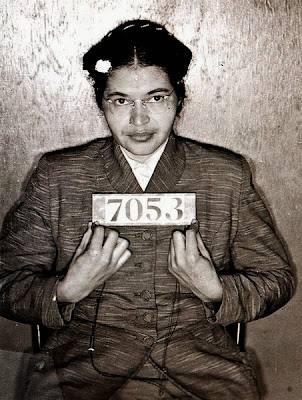Rosa Parks Day Spotlights Heroism of Civil Rights Icon

Rosa Parks booking photo after arrest in Montgomery, Ala. that sparked the modern day Civil Rights Movement. Photo courtesy of Public Domain Clip Art.com.
BY DANIEL WINNER | AC JosepH Media Correspondent
ATLANTIC CITY — Friday, Dec. 1 marks the anniversary of a daring display of resistance in the history of the civil rights movement.
In 1955, Rosa Louise McCauley Parks refused to give up her bus seat to a White passenger in Montgomery, Ala., after she was ordered to vacate an entire row of seats.
First celebrated by the Michigan State Legislature in 1998, Rosa Parks Day commemorates the woman who took it upon herself to defy an unjust system of oppression against Black Americans. Her courage is now remembered across the country as a prime example of civil disobedience.
Rosa Parks was born on Feb. 4, 1913, in Tuskegee, Ala. to schoolteacher Leona née Edwards and carpenter James McCauley. Apart from her African ancestry, Parks was also Scots-Irish and Native American through her grandparents.
Raised on a farm, she spent much of her early years learning how to sew from her mother and grandmother, while taking courses at the Industrial School for Girls in Montgomery.
At the time of her childhood, Confederate states had already enacted new Jim Crow laws that enforced racial segregation and inequality based on class. States like Alabama adopted policies for public facilities and transportation, which included seating arrangements for Black and White passengers.
Parks recalled the bus being one of the many ways that Black Americans faced unfair treatment, such as when bus drivers failed to stop for Black passengers.
“I’d see the bus pass every day … But to me, that was a way of life; we had no choice but to accept what was the custom. The bus was among the first ways I realized there was a black world and a white world.”
In 1943, Parks joined the Montgomery chapter of the NAACP and was quickly elected secretary. It was during her time here that she became immersed in the civil rights movement and made a decision that would change the history of civil rights in the United States.
Montgomery City Lines, the National City Lines subsidiary bus system in Montgomery, Ala., had adopted a city ordinance that segregated passengers by race. Around 6 p.m. on Dec. 1, 1955, Rosa Parks boarded the Cleveland Avenue bus and sat in the first row of back seats in the “colored” section.
After seats designated for White passengers were filled to capacity, the bus driver moved the “colored” section sign toward the back and ordered the four Black passengers seated to relinquish their seats to the White people onboard. Parks moved to the window seat of the same row, refusing to relocate because of her color.
In a later interview, Parks recalled bus driver James F. Blake’s response.
“When he saw me still sitting, he asked if I was going to stand up, and I said, ‘No, I’m not.’ And he said, ‘Well, if you don’t stand up, I’m going to have to call the police and have you arrested.’ I said, ‘You may do that.’”
Parks was promptly arrested and charged with a violation of Chapter 6, Section 11, segregation law of the Montgomery City code. She was found guilty of disorderly conduct and violating a city ordinance. Her lawyer Clifford Durr and Montgomery NAACP President Edgar Nixon bailed her out that same evening.
Parks’ act of civil disobedience led to the formation of the Montgomery Improvement Association (MIA), led by Edgar Nixon, Ralph Abernathy, and Martin Luther King Jr. This was the beginning of the Montgomery bus boycott, a campaign against the public transit system of Montgomery.
Joined by prominent civil rights and community leaders, locals protested segregation laws by refusing to use public transportation in a demonstration that lasted more than a year from Dec. 5, 1955 to Dec. 20, 1956.
As a result, Montgomery City Lines became effectively bankrupt after losing about $750,000, which today would be equivalent to $8.1 million. The United States Supreme Court ruled in the case Browder v. Gayle that Montgomery and Alabama segregation laws were unconstitutional and that black passengers have the right to any publicly available seat.
Today, Rosa Parks is remembered as an icon and pioneer of equality and justice in the United States. She went on to lead a career in civil rights activism, becoming involved in the Black Power movement and organizing for the freedom of political prisoners, primarily those involved in cases of self-defense.
After her passing in 2005, Parks became the first woman and second person of color to lie in honor in the Capitol Rotunda.
Rosa Parks Day is celebrated in only a select number of states, as well as a few sparse cities and counties. California and Missouri honor Parks on her birthday, Feb. 4, while Michigan celebrates on the first Monday after her birthday. Only five other states celebrate her achievement on Dec. 1, namely, Alabama, Ohio, Oregon, Texas, and Tennessee.
In New Jersey, the city of Paterson in Passaic County is the only municipality in the state that officially recognizes Rosa Parks Day.
EDITOR’S NOTE: Daniel Winner has a double major in Religious Studies and Japanese from Penn State University and has traveled internationally to the Far East on several occasions. His insights on Asian culture give a unique view of historical and modern trends. He will be serving as a contributor for Front Runner New Jersey.
Follow Us Today On:
Note from AC JosepH Media: If you like this story and others posted on Front Runner New Jersey.com, lend us a hand so we can keep producing articles like these for New Jersey and the world to see. Click on SUPPORT FRNJ and make a contribution that will go directly in making more stories like this available. Thank you for reading!




